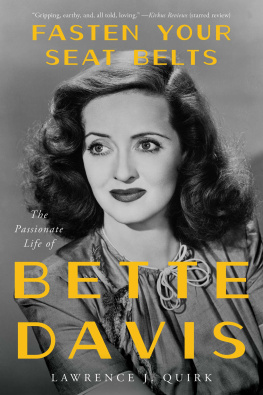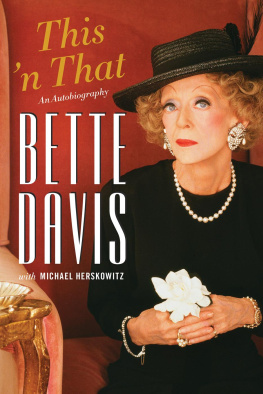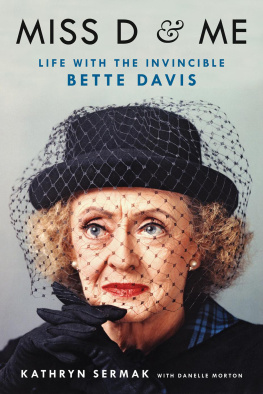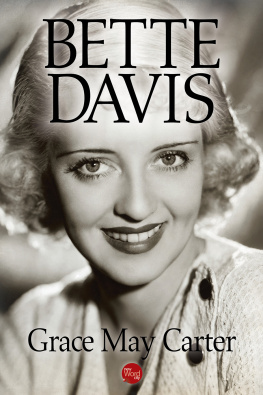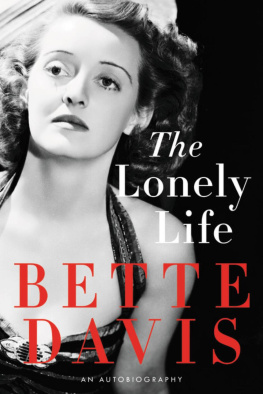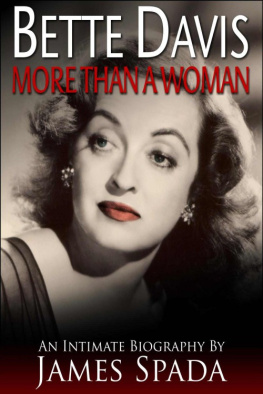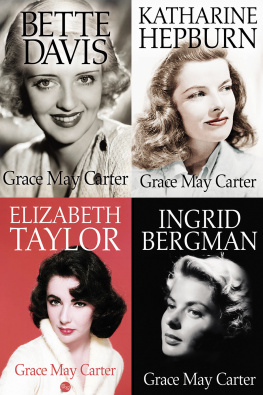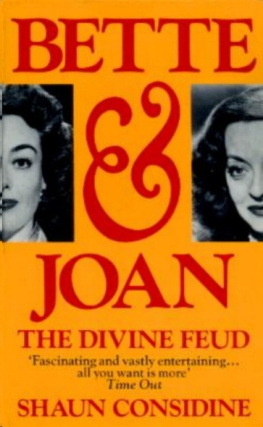Bette Davis
David Thomson is, among many other things, author of The New Biographical Dictionary of Film, now in its fourth edition. His recent books include a biography of Nicole Kidman, completing and editing Fan Tan (a novel started by Marlon Brando and Donald Cammell) and The Whole Equation: A History of Hollywood. His latest work is the acclaimed Have You Seen? A Personal Introduction to 1,000 Films. Born in London, he now lives in San Francisco.
PENGUIN BOOKS GREAT STARS
David Thomson
Humphrey Bogart
Ingrid Bergman
Gary Cooper
Bette Davis
Bette Davis
DAVID THOMSON
Photo research by Lucy Gray

GREAT STARS
For Grace
PENGUIN BOOKS
Published by the Penguin Group
Penguin Books Ltd, 80 Strand, London WC2R 0RL , England
Penguin Group (USA) Inc., 375 Hudson Street, New York, New York 10014, USA
Penguin Group (Canada), 90 Eglinton Avenue East, Suite 700, Toronto, Ontario, Canada M4P 2Y3 (a division of Pearson Penguin Canada Inc.)
Penguin Ireland, 25 St Stephens Green, Dublin 2, Ireland (a division of Penguin Books Ltd)
Penguin Group (Australia), 250 Camberwell Road, Camberwell, Victoria 3124, Australia (a division of Pearson Australia Group Pty Ltd)
Penguin Books India Pvt Ltd, 11 Community Centre, Panchsheel Park, New Delhi 110 017, India
Penguin Group (NZ), 67 Apollo Drive, Rosedale, North Shore 0632, New Zealand (a division of Pearson New Zealand Ltd)
Penguin Books (South Africa) (Pty) Ltd, 24 Sturdee Avenue, Rosebank, Johannesburg 2196, South Africa
Penguin Books Ltd, Registered Offices: 80 Strand, London WC2R 0RL , England
www.penguin.com
First published 2009
Copyright David Thomson, 2009
All rights reserved
The moral right of the author has been asserted
Except in the United States of America, this book is sold subject to the condition that it shall not, by way of trade or otherwise, be lent, re-sold, hired out, or otherwise circulated without the publishers prior consent in any form of binding or cover other than that in which it is published and without a similar condition including this condition being imposed on the subsequent purchaser
ISBN: 978-0-14-193145-6
Bette Davis was twenty-three and too smart for her own good. But there she was lying on a couch at Universal in a fixed camera set-up so that any man the studio could round up came in and made movie love to her. You gorgeous, divine darling, they said they had to say something, so they had lines written for them. I adore you. I worship you. I must possess you. There were fifteen of them The most compulsively dedicated harlot never had a morning like mine, she would write and there you see how smart she was. Not just funny, but able to surmount her own indignity with caustic intelligence. She was a novice being tested for chemistry, or it, or sex appeal. This was after Carl Laemmle, the head of the studio had announced with her in the next room and the door open She has as much sex appeal as Slim Summerville! Summerville was fortyish, a country hick with a simpleton cowboy face. He was just a little niftier than his horse.
We can talk about what Bette Davis had and didnt have, and what you might like to have done to her if you were a red-blooded American male. Suffice it to say that with Bette Davis, her looks and her sexiness her appetite for the movies were always under question. Well, she was never beautiful, you hear people say. But the same Bette Davis, in those years from 1931 to 1945 the golden age, more or less was nominated seven times for best actress. In the same period, Garbo got one nomination, Katharine Hepburn four, Marlene Dietrich one, Claudette Colbert three, Barbara Stanwyck three. Davis outpaced the field without ever convincing a studio or maybe herself that she had it. Simple, unequivocal desirability. Yet something possessed her, an energy or a need that could leave every other actress seeming vacant.
The thing she asserted was that there were Bette Davis parts, a territory where other actresses had best not tread. For there was something fearsome in being Bette Davis, something that seemed close to consuming the woman herself. Its a part of the nature of acting in those days, and of the terrible insecurity of actresses, that several of the great parts might have been recast Irene Dunne surely could have played Mrs Miniver, Barbara Stanwyck could have done Mildred Pierce, Katharine Hepburn could have been in My Man Godfrey, Claudette Colbert was actually cast as Margo Channing in All About Eve and I am tempted to share the ladys own imperious view, that Bette Davis would have been a natural as Scarlett OHara It was insanity that I not be given Scarlett. (The essence of Davis, it seems to me, is in the use of the word given there, as opposed to some such construction as be cast as. The gift was
Never beautiful?
something the common people should have seen as appropriate to their queen, and it should have required no asking from her!)
In other words, competition the helpless state of the harlot was as open as the studio contract system allowed. And Bette Davis had at least a dozen rivals who photographed better than she did, or who had more glamour or lustre, more gender obedience and more of it than she could offer. Yet she was the commanding figure of the great era of stardom and star projects. Moreover, most of that time, she was employed and held by a guys studio where the bosses would tell her to her face that not a single man was going to pay money to see this or that project. Lets add that she had another three best actress nominations after 1945 in All About Eve, The Star and What Ever Happened to Baby Jane?. Come to that, one has to note and marvel how in her heady years she was not actually nominated for Of Human Bondage, The Old Maid or The Private Lives of Elizabeth and Essex.
I doubt there is a better example of willpower thriving in the alleged age of sex appeal. Her own insistence that she was right for a role, or the best actress around, is not always sympathetic. But it is much harder to make a case for her being wrong. She prided herself on exact judgement and insight, on reason and justice New England virtues and never quite realized that on the West Coast the country was run rather differently.
Ruth Elizabeth Davis was born on 5 April 1908 in Lowell, Massachusetts. This was nine months and four days after the marriage of her parents: Harlow Morrell Davis, of Bates College and Harvard Law School, and Ruth Favor, an amateur actress of some ability. The Favors were of French descent, while the Davises had been in Massachusetts since 1634 and in Wales before that. It was a Davis who had helped found the city of Haverhill. Harlow Morrell Davis had a great dome of a forehead, rimless spectacles and a most earnest gaze. He would have been shocked if, say, his first child had been delivered less than nine months after the day of his marriage. Nevertheless, he had not intended to have a family so swiftly and the father proved incapable of talking to Ruth or to her younger sister, Barbara, born eighteen months later. Aged five, apparently, Ruth decided to alter her name to Bette a name she had seen on the spine of a Balzac novel. The father thought the change was pretentious, and that attitude only offended Bette the more. When Bette was seven, the father left the family.
By the time Bette was twenty, she was resolved to be an actress. The mother passed this information on to the father, who was reported as having said, Let her become a secretary! Shell earn money quicker. Bette could never be a successful actress. The young girl took this as a challenge, just as she now perceived her father as a negative force. It was a part of her larger determination to triumph, to do as she wished, and to lead what would amount to her lonely life. In 1962, Bette Davis published a short memoir called
Next page

